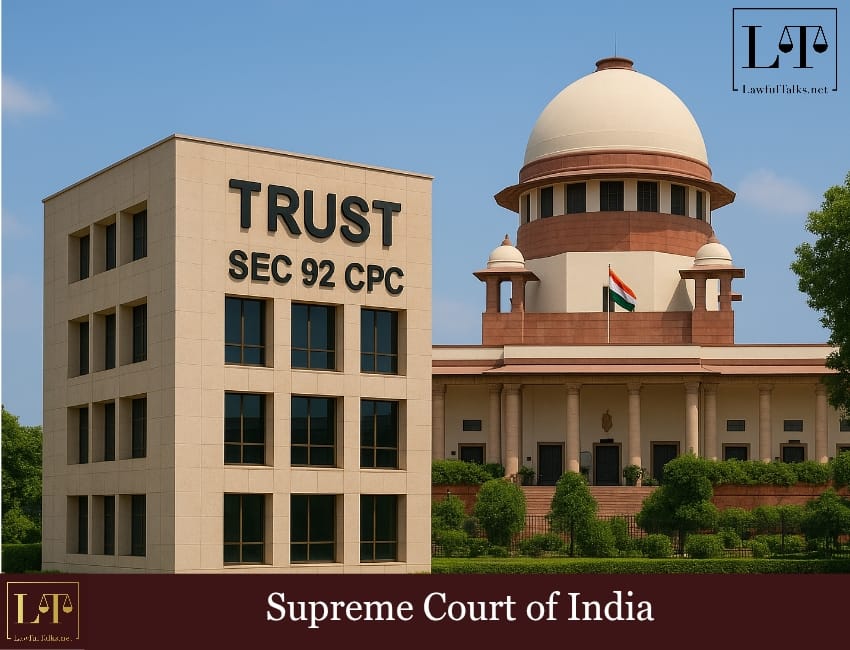Allahabad HC Sets Aside Afzal Ansari's Conviction, Allows Him to Continue as MP

In a landmark ruling in Operation Asha v. Shelly Batra & Others, the Supreme Court—through Justices J.B. Pardiwala and R. Mahadevan—has delivered a comprehensive guide on the scope of Section 92 of the Civil Procedure Code (CPC) and the circumstances under which a registered society may be treated as a constructive trust.

Section 92 CPC – The Basics
Section 92 suits are special representative actions filed on behalf of the public to protect charitable or religious trusts. Before such a suit proceeds, the plaintiff must obtain leave of the court, a safeguard against frivolous or harassing litigation against public trusts.
Importantly, at the leave stage, courts do not decide the merits—they only ensure procedural eligibility.
Key Conditions for Maintainability
Drawing from Ashok Kumar Gupta v. Sitalaxmi Sahuwala Medical Trust (2020), the Court reiterated that for a Section 92 suit to be maintainable:
-
The trust must be for public purposes of a charitable or religious nature.
-
There must be either:
-
a breach of trust, or
-
a need for court direction for trust administration.
-
-
The relief sought must be one listed in Section 92(1) CPC.
Failing any one condition defeats maintainability; all must be met for success.
Who Counts as the Public?
A trust serves a public purpose when Its beneficiaries are the general public or an unascertained class (e.g., a community or group), not a fixed set of individuals.
Trust or Constructive Trust?
The Court explored when an organisation—particularly a registered society—can be treated as a trust:
Inferring a Public Trust Without Formal Recognition
A trust may be inferred from:
-
Property acquisition and purpose (public benefit vs. personal gain).
-
Conditions on use of the property.
-
Complete dedication of property for a cause.
-
Public user rights over the property.
-
Application of profits towards the organisation’s objectives.
If such features existed before a society was registered under the Societies Registration Act, 1860, it remains a public trust despite later registration (Kesava Panicker v. Damodara Panicker).
Registration Matters—But Not Always
If registered from inception as a society, its property is not automatically trust property. Section 5 of the Societies Registration Act vests property either in Trustees, or the governing body (as fiduciaries, not beneficial owners).
Constructive Trusts – The Legal Twist
A constructive trust arises by operation of law, often to prevent unjust enrichment:
-
The fiduciary cannot conscientiously retain property meant for beneficiaries.
-
A breach occurs if the fiduciary misapplies property or gains personal benefit.
-
Even without diversion of funds, court directions may be needed for proper administration.
The Court noted that societies, though not express trusts, may still operate under constructive trusts if these elements are present.
Who Can Sue?
“Persons having an interest” in the trust must have a present and substantial interest, not merely sentimental or remote.
Reliefs Under Section 92
Reliefs must match those in clauses (a)–(g) of Section 92(1) CPC. The “other relief” clause (h) is valid only if it is akin in nature to those listed.
Public Purpose at the Core
A Section 92 suit must be fundamentally in the public interest. Courts must assess the true nature of the action, not just the relief claimed. Private rights alone cannot be pursued under this section.
The ruling underscores that registered societies can, in certain circumstances, be treated as constructive trusts—especially where public property or charitable assets are involved. For litigants, meeting all conditions of Section 92 CPC is non-negotiable, and for societies, fiduciary responsibility remains paramount.
Case Title: Operation Asha v. Shelly Batra & Others., Civil Appeal No.10048 of 2025
Leave a Comment

Aishwarya Yashwantrao
Advocate, Bombay High Court
Latest Posts
Categories
- International News 19 Posts
- Supreme Court 323 Posts
- High Courts 337 Posts


































































































































































































































































































































































































































































































































































































































































































